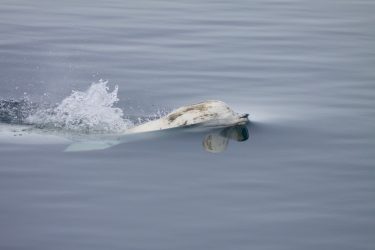
The annual migration of some beluga whales in Alaska is altered by sea ice changes in the Arctic, while other belugas do not appear to be affected.
A new study led by the University of Washington finds that as Arctic sea ice takes longer to freeze up each fall due to climate change, one population of belugas mirrors that timing and delays its migration south by up to one month. In contrast, a different beluga population, also in Alaska, that migrates and feeds in the same areas doesn’t appear to have changed its migration timing with changes in sea ice.
The paper was published Dec. 21 in the journal Global Change Biology.
“The biggest take-home message is that belugas can respond relatively quickly to their changing environment, yet we can’t expect a uniform response across all beluga populations,” said lead author Donna Hauser, a postdoctoral researcher at the UW’s Polar Science Center.
Kate Stafford, co-author and oceanographer at UW Environment and the Applied Physics Lab, said that use of underwater microphones is a good way to detect belugas — and a range of other animals in the Arctic — in their dark, icy environment. The information she collected for this project was one of two data sets that let the researchers track exactly when belugas passed certain key points along their fall migration, then correlate those days to regional sea ice information.
“One of the predictions of climate change is animals are going to change their seasonal presence in a region,” Stafford said. “This study shows that at least one population of belugas might be adapting to rapid changes in its environment. We can’t be sure, but this study is a start in documenting how an Arctic species is reacting to these changing conditions.”
Read more at UW Today »
